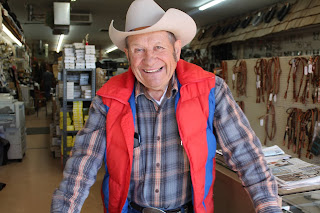Bob Schild’s ride is over. He left us January 20. And, no matter what criteria you use
for judging, Bob made the whistle on a winning ride.
The years found Bob in a variety of arenas. He was a rodeo cowboy of
the first order, successful in all the rough stock events with numerous championships
to his credit. He was a businessman, establishing and operating B-Bar-B Leather
for decades, building and selling saddles, rodeo gear, and providing all manner
of horse equipment; a business passed down to his sons. He was a poet, long
before cowboy poetry became the thing to do.
When I first thought to pen poetry, I looked to Bob’s work for
inspiration and an education. Beyond mere rhyming stories, Bob’s verse showed
literary technique, deep thinking, and attention to craft. I wanted to meet
him.
I tracked Bob down at the National Circuit Finals Rodeo one year,
where I found him sweeping up under the grandstands. That’s the way Bob was—always
willing to lend a hand and do any job that needed doing. He was happy to make
my acquaintance and willing to talk poetry and rodeo anytime, any place.
We became friends, and for years engaged in a one-sided admiration
society. I had little to contribute to the relationship. Bob gave it his all. I
wish time and distance hadn’t gotten in the way of my spending more time with him.
A few magazine articles focusing on Bob found their way into
print, and it was difficult for me as a writer to maintain any semblance of
objectivity when writing about him.
I will never forget Bob Schild. Even though the whistle has sounded,
his winning score is permanently inked in the record books.




